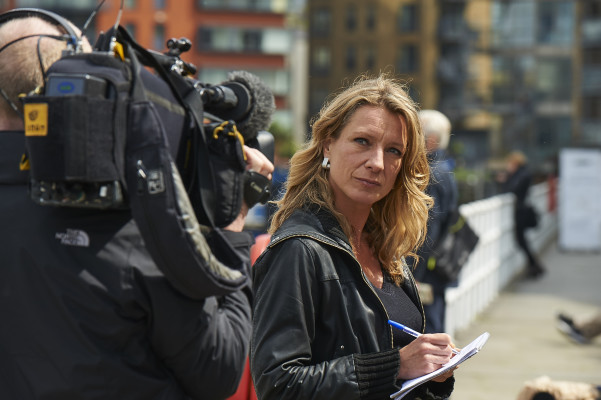Interactive Chats: The journey of the user
APM Reports, Charles Minshew, Devil We Know, Evil Genius, Ghost Fleet, In the Dark, Investigatetv, Investigative Reporters and Editors, Ire, Jamie Grey, Netflix, Post, Reynolds Journalism Institute, RJI, School of Journalism, University of Missouri, Will Craft, Partners, Videos
James Gordon, Innovation and Futures Lab editor, spoke with Juliana Ruhfus, an investigative filmmaker and interactive producer at Al Jazeera, to learn more about InterviewJS. This month for Innovation in Focus we experimented with the InterviewJS platform to tell the stories of mid-Missouri teachers. Ruhfus said the idea for InterviewJS was rooted in her earlier interactive projects like Syhacked, an interactive news game that puts the user on the digital frontlines of Syria’s civil war.

Gordon: How did you become interested in this chat-style storytelling format?
Ruhfus: It’s so intuitive to consume content by texting on mobile. When I was researching and writing the Google application [for a Digital News Innovation Fund grant], I looked a lot at chatbot storytelling, and I was feeling sucked in by the format. I thought if we can replicate that for journalism, then that’s a worthwhile idea.
Gordon: Why a chat-style interface as opposed to the traditional more linear narrative-style of storytelling?
Ruhfus: I felt there was a lot of stuff out there that was promising to be interactive, but for me, to be truly interactive, the journey of the user and the decision of the user needs to change the outcome of the story that is being consumed. That was a really big deal in the Syrian cyberwar app. Like if you click the wrong thing, you get hacked. Even if it is just in a small way, I’m trying to create something where the narrative path changes.
Gordon: What’s your favorite InterviewJS story so far?
Ruhfus: I think Ali Rae’s story is really good.
Gordon: What kind of story is a good candidate to be presented as an InterviewJS story?
Ruhfus: Unexpectedly, the ones that I found most fun are the ones that were re-versioned [from older interviews]. I think it’s really cool that you can speak to presidents. And it’s still absolutely journalism as long as you have the interview text as what people have said. Then you can throw in video from White House press conferences and stuff like that. The re-versioned ones were the ones I was getting most excited about because there’s sense of immediate contact, contact with people that I would never really be in contact with.
Gordon: Are there any ethical concerns around editing that kind of story? For example, how do you decide what questions should prompt what responses? You have the stuff they said before, but you’re kind of like re-contextualizing it, no?
Ruhfus: Yeah. I think there are questions with that, and I think they’ll probably also come more into focus when people use [InterviewJS] more. But I’ve found with a lot of all the interactive projects that I did, in the end it’s the same rules. The traditional rules of journalism apply. It’s about contextualizing and being truthful and not editing the quotes too much, stuff like that. The fears were bigger in the beginning, but then when you use it, you think “Actually, it’s journalism.”
Gordon: What advice would you give to someone who wanted to try InterviewJS for the first time?
Ruhfus: Really focus on the questions. The obvious, intuitive instinct is to focus on the answers that you curate. The building blocks come from the answers, but the creativity is in the questions because that’s the content that you can control. That’s where you have freedom to script as you like.
The best InterviewJS stories are the ones where a really serious amount of thinking is going into the questions and the choices [presented to the user].
Gordon: Is there anything else you would like to share?
Ruhfus: Like with all the new tech stuff, just experiment. Just try it and see if comes to life. Don’t overthink it. Start, and then start it again. This is why we also allow you to re-publish the story and to re-edit it. Quite a lot of thought went into that as well.
Editor’s Note: This interview has been edited for length and clarity.